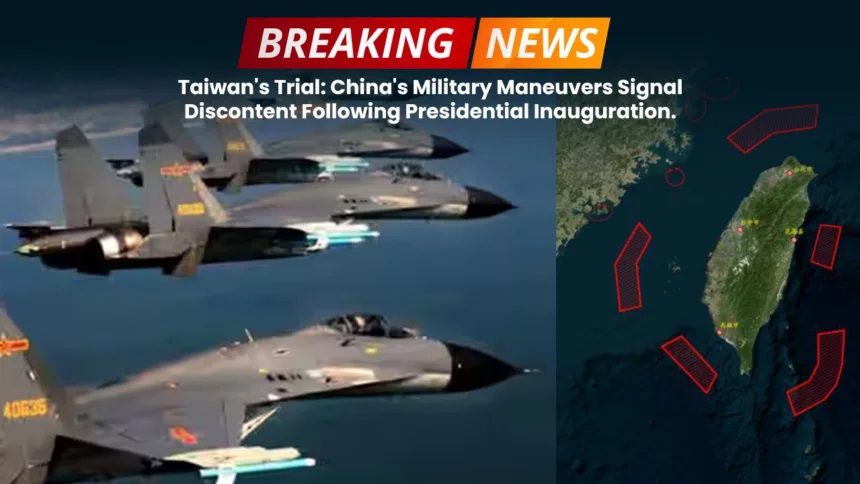China has initiated two days of military exercises surrounding Taiwan, citing them as “punishment” for what it perceives as “separatist acts” following the island’s recent election and the inauguration of a new president.
State media outlets from China reported that numerous People’s Liberation Army (PLA) fighter jets, armed with live missiles, conducted simulated strikes against “high-value military targets” as part of the drills. The exercises also involved navy and rocket forces. Although images of China’s land-based Dongfeng ballistic missiles were circulated online, it was not specified if they were utilized during the drills.
More Read
In response to these maneuvers, Taiwan’s military declared a state of alert, asserting confidence in its ability to safeguard the island. The defense ministry affirmed that sea, air, and ground forces were on high alert, with enhanced security measures implemented across military installations. Additionally, air defense and missile units were directed to monitor potential threats while preparing for cognitive warfare operations.
In the shadow of military drills, Taiwan stands firm, a testament to our unwavering commitment to sovereignty and peace in the face of adversity.
Dubbed Joint Sword-2024A, the drills encompass units from the PLA’s army, navy, air force, and rocket force operating in the Taiwan Strait and surrounding areas. Chinese state media quoted PLA spokesperson Li Xi, affirming that the exercises served as a “strong punishment” for what China perceives as “separatist acts” and as a “stern warning” against external interference.
Despite Taiwan condemning the drills as “irrational provocation,” Chinese state media defended them as legitimate countermeasures. Analysts speculate that these exercises, bearing the “2024A” suffix, could signify further military actions targeting Taiwan throughout the year.
Relations between China and Taiwan have been tense, with Beijing asserting Taiwan as a province of China and vowing to reclaim it, if necessary, by force. Taiwan adamantly rejects Chinese rule and urges Beijing to cease hostilities, advocating for peaceful dialogue instead.
These latest drills come amid heightened tensions in the region, characterized by increased Chinese military activities near Taiwan, economic coercion, and cognitive warfare tactics aimed at influencing Taiwan’s stance.
While military experts view these exercises as a warning signal, Deputy Commander of US Indo-Pacific Command, Lt Gen Stephen Sklenka, emphasized that conflict between the two nations is not inevitable. He called for condemnation of China’s actions by foreign governments to prevent the normalization of such behavior.
Meanwhile, Japan expressed concern over the drills, with Chief Cabinet Secretary Yoshimasa Hayashi affirming Japan’s commitment to maintaining peace and stability in the Taiwan Strait. Japan’s proximity to Taiwan and its alliance with the US have heightened its apprehension regarding China’s actions in the region.
As tensions persist, the international community closely watches developments in the Taiwan Strait, hoping for a peaceful resolution to the longstanding dispute between China and Taiwan.












